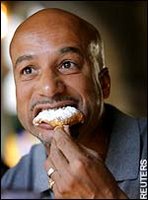Major Depressive Episode
A. Five (or more) of the following symptoms have been present during the same 2-week period and represent a change from previous functioning; at least one of the symptoms is either (1) depressed mood or (2) loss of interest or pleasure.
Note: Do note [sic] include symptoms that are clearly due to a general medical condition, or mood-incongruent delusions or hallucinations.
(1) depressed mood most of the day, nearly every day, as indicated by either subjective report (e.g., feels sad or empty) or observation made by others (e.g., appears tearful). Note: In children and adolescents, can be irritable mood.
(2) markedly diminished interest or pleasure in all, or almost all, activities most of the day, nearly every day (as indicated by either subjective account or observation made by others)
(3) significant weight loss when not dieting or weight gain (e.g., a change of more than 5% of body weight in a month), or decrease or increase in appetite nearly every day. Note: In children, consider failure to make expected weight gains.
(4) insomnia or hypersomnia nearly every day
(5) psychomotor agitation or retardation nearly every day (observable by others, not merely subjective feelings of restlessness or being slowed down)
(6) fatigue or loss of energy nearly every day
(7) feelings of worthlessness or excessive or inappropriate guilt (which may be delusional) nearly every day (not merely self-reproach or guilt about being sick)
(8) diminished ability to think or concentrate, or indecisiveness, nearly every day (either by subjective account or as observed by others)
(9) recurrent thoughts of death (not just fear of dying), recurrent suicidal ideation without a specific plan, or a suicide attempt or a specific plan for committing suicide
B. The symptoms do not meet criteria for a Mixed Episode.
C. The symptoms cause clinically significant distress or impairment in social, occupational, or other important areas of functioning.
D. The symptoms are not due to the direct physiological effects of a substance (e.g., a drug of abuse, a medication) or a general medical condition (e.g., hypothyroidism).
E. The symptoms are not better accounted for by Bereavement, i.e., after the loss of a loved one, the symptoms persist for longer than 2 months or are characterized by marked functional impairment, morbid preoccupation with worthlessness, suicidal ideation, psychotic symptoms, or psychomotor retardation.
Major Depressive Disorder
Single Episode
A. Presence of a single Major Depressive Episode
B. The Major Depressive Episode is not better accounted for by Schizoaffective Disorder and is not superimposed on Schizophrenia, Schizophreniform Disorder, Delusional Disorder, or Psychotic Disorder Not Otherwise Specified.
C. There has never been a Manic Episode, a Mixed Episode, or a Hypomanic Episode. Note: This exclusion does not apply if all the manic-like, mixed-like, or hypomanic-like episodes are substance or treatment induced or are due to the direct physiological effects of a general medical condition.
Recurrent
A. Presence of two or more Major Depressive Episodes
Note: To be considered separate episodes, there must be an interval of at least 2 consecutive months in which criteria are not met for a Major Depressive Episode.
B. The Major Depressive Episodes are not better accounted for by Schizoaffective Disorder and are not superimposed on Schizophrenia, Schizophreniform Disorder, Delusional Disorder, or Psychotic Disorder Not Otherwise Specified.
C. There has never been a Manic Episode, a Mixed Episode, or a Hypomanic Episode. Note: This exclusion does not apply if all the manic-like, mixed-like, or hypomanic-like episodes are substance or treatment induced or are due to the direct physiological effects or a general medical condition.
Specify (for current or most recent episode):
Severity/Psychotic/Remission Specifiers
Chronic
With Catatonic Features
With Atypical Features
With Postpartum Onset
Specify
Longitudinal Course Specifiers (With and Without Interepisode Recovery)
With Seasonal Pattern
 Not really, just leaving Blogger (that flashing shit is driving my ass battier): g-bitch.com. (If you forget the dash, you get--predictably--porn. I know you'll leave it out now.)
Not really, just leaving Blogger (that flashing shit is driving my ass battier): g-bitch.com. (If you forget the dash, you get--predictably--porn. I know you'll leave it out now.)





















